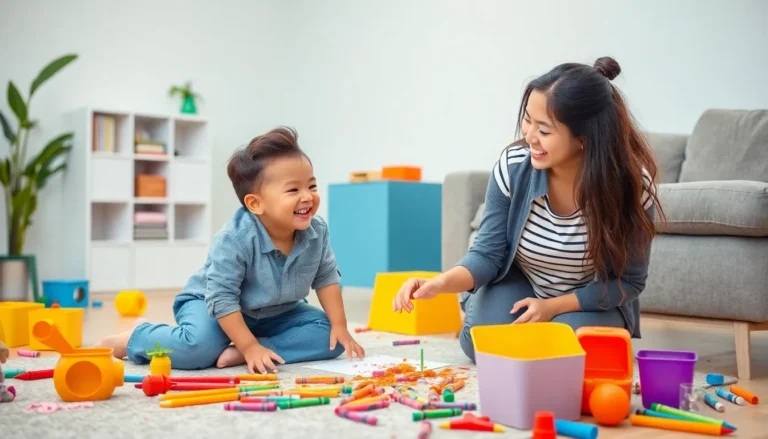Table of Contents
ToggleIn a world filled with parenting advice that ranges from the absurd to the downright intimidating, gentle parenting emerges like a warm hug on a chilly day. This approach isn’t just about soft voices and cuddles; it’s a powerful method that combines empathy, respect, and a sprinkle of humor to nurture strong relationships with kids. Imagine teaching your child how to navigate life’s challenges without turning into a referee in a wrestling match—sounds appealing, right?
Gentle parenting techniques focus on understanding a child’s feelings and guiding them with kindness instead of punishment. It’s about creating a supportive environment where children can express themselves freely while learning important life skills. So if you’re ready to swap out the traditional shouting matches for a more harmonious household, buckle up! This journey into gentle parenting could be the game changer your family needs.
Overview of Gentle Parenting Techniques
Gentle parenting techniques focus on communication, connection, and compassion. Empathy serves as a cornerstone of this approach, allowing parents to understand their child’s feelings and respond appropriately. Respect plays a crucial role, as it nurtures a child’s self-esteem and encourages open dialogue.
Active listening constitutes a key strategy. Parents listen attentively, demonstrating that they value their child’s words and emotions. This practice fosters trust and strengthens the parent-child bond. Using positive reinforcement, parents encourage desired behaviors rather than resorting to punishment. Recognizing achievements, big or small, motivates children and promotes self-discipline.
Setting clear boundaries aids in guiding behavior while maintaining a supportive environment. Parents can explain rules and expectations, allowing their children to feel secure and understood. Redirecting negative behavior with gentle responses instead of harsh reactions helps children learn appropriate actions without fear.
Flexibility emerges as another vital component. Parents adapt techniques based on their child’s unique needs and personality. Understanding that each child is different means adjustments in approach are necessary for effective communication and connection.
Mindfulness fosters patience during challenging moments. Parents practice staying calm and focused, which models emotional regulation for their children. Supporting emotional expression encourages children to articulate their feelings, promoting healthier coping mechanisms.
Utilizing humor also adds a light-hearted element to parenting. Laughter strengthens relationships and creates memorable experiences. Engaging activities, such as playtime or creative projects, enhance the bond between parent and child while encouraging exploration and learning.
Implementing these gentle parenting techniques cultivates a nurturing environment, producing well-adjusted, confident children ready to face life’s challenges.
Key Principles of Gentle Parenting

Gentle parenting focuses on fostering strong relationships through empathy, respect, and understanding. Several key principles guide this nurturing approach.
Empathy and Understanding
Empathy drives effective communication between parents and children. Understanding a child’s feelings leads to better emotional support, creating a safe space for them to express themselves. This connection fosters trust and encourages open dialogue. Parents can strive to view situations from their child’s perspective, validating emotions instead of dismissing them. Practicing empathy involves active listening, which enhances feelings of acceptance and connection. Demonstrating understanding helps children manage their emotions, empowering them during challenging times. Overall, empathetic responses deepen the parent-child bond and promote emotional intelligence.
Consistency and Structure
Consistency provides a reliable framework within which children can thrive. Establishing routines and clear expectations helps children understand their environment, reducing anxiety related to uncertainty. Predictable responses to behavior encourage accountability, allowing children to learn from their actions. Structure sets boundaries while still offering flexibility to adapt to individual needs. Parents can maintain consistency through ongoing communication, reinforcing the importance of rules and guidelines. Supporting growth and development within a structured environment nurtures security and confidence in children. Consistency, when paired with love and respect, promotes a sense of stability essential for emotional well-being.
Practical Gentle Parenting Techniques
Gentle parenting emphasizes nurturing and respectful approaches to child-rearing. This section elaborates on effective techniques for fostering healthy relationships.
Communication Strategies
Active listening plays a pivotal role in gentle parenting. Parents prioritize understanding their child’s feelings by giving them undivided attention. Open-ended questions encourage children to express emotions fully. Reflecting on what children say validates their feelings and fosters connection. Utilizing “I” statements clarifies feelings without assigning blame, making discussions constructive. Parents should also express empathy, acknowledging their child’s perspective during conversations. Consistency in communication strengthens trust, allowing children to feel safe exploring their emotions.
Positive Discipline Approaches
Positive discipline focuses on teaching rather than punishing. Parents emphasize guiding children towards desirable behavior through reinforcement. Setting clear expectations helps children understand boundaries without fear of punishment. Time-ins replace time-outs, allowing for reflection in a supportive context. When misbehavior occurs, parents can address the underlying causes rather than reacting with frustration. Encouraging problem-solving fosters independence and critical thinking skills. Rewarding good behavior with praise boosts self-esteem and motivation, promoting a cooperative atmosphere.
Benefits of Gentle Parenting
Gentle parenting fosters emotional security, which helps children feel safe and understood. Children develop strong self-esteem as parents practice respect and validation. Increased emotional intelligence becomes evident as kids learn to express their feelings.
Promoting open communication leads to healthier relationships between parents and children. Trust builds in an environment where children’s voices matter. Positive reinforcement encourages kids to learn from their behaviors instead of fearing punishment.
Emphasis on setting clear boundaries helps children understand expectations while maintaining a supportive atmosphere. Flexibility allows parents to adapt strategies that best suit individual children’s needs. Mindfulness contributes to patience, creating calmer interactions during challenging moments.
Engaging in activities together strengthens parent-child bonds, fostering attachment. Humor lightens difficult situations, making parenting more enjoyable. Through this approach, families experience reduced conflict and increased harmony in daily life.
Empathy’s role cannot be overstated. In understanding children’s emotions, parents equip their kids with the tools to navigate complex feelings. Moreover, consistency and structure offer children the reliability they crave for emotional well-being.
Overall, gentle parenting techniques lead to well-adjusted, confident children prepared for life’s challenges. These benefits resonate throughout the family, creating a nurturing environment that supports social and emotional development. Prioritizing connection and compassion generates lasting positive effects on children’s overall growth.
Challenges of Implementing Gentle Parenting Techniques
Implementing gentle parenting techniques presents various challenges. Consistency may prove difficult, as parents often encounter stressors that test their ability to remain calm and empathetic. Many parents struggle to balance responsiveness with setting clear boundaries, creating frustration when expectations aren’t met.
Time constraints further complicate matters. Busy schedules leave little room for mindfulness, making it hard to practice patience during challenging moments. Emotional fatigue can undermine parents’ ability to engage in effective communication and positive discipline.
Resistance from children might also arise. When children are accustomed to more traditional discipline methods, they may react negatively to shifts in approach. Some parents fear that gentle techniques could lead to a lack of discipline or boundaries, leading to hesitance in fully committing to this style.
Peer influence adds another layer of complexity. Parents may feel pressure to conform to conventional parenting practices, leading to confusion about their chosen methods. This external pressure can cause inconsistency, negatively impacting the parent-child relationship.
Lack of resources or support can hinder progress. Accessing reliable information and community support makes implementing gentle parenting techniques easier. Without these, parents may feel isolated and overwhelmed.
Ultimately, understanding these challenges can help parents navigate the complexities of gentle parenting. Engaging with supportive communities and seeking educational resources empowers them to embrace gentle techniques fully and create nurturing family environments.
Embracing gentle parenting techniques can transform family dynamics and foster deeper connections between parents and children. By prioritizing empathy and open communication, parents can create a nurturing environment that encourages emotional growth and resilience. While challenges may arise, staying committed to these principles can lead to lasting positive changes in children’s behavior and self-esteem.
As parents navigate this journey, they should remember that flexibility and patience are key. Each child’s unique needs require tailored approaches, and the rewards of gentle parenting extend far beyond the immediate moment. Ultimately, this approach not only shapes confident and well-adjusted children but also cultivates a harmonious family life filled with trust and understanding.








